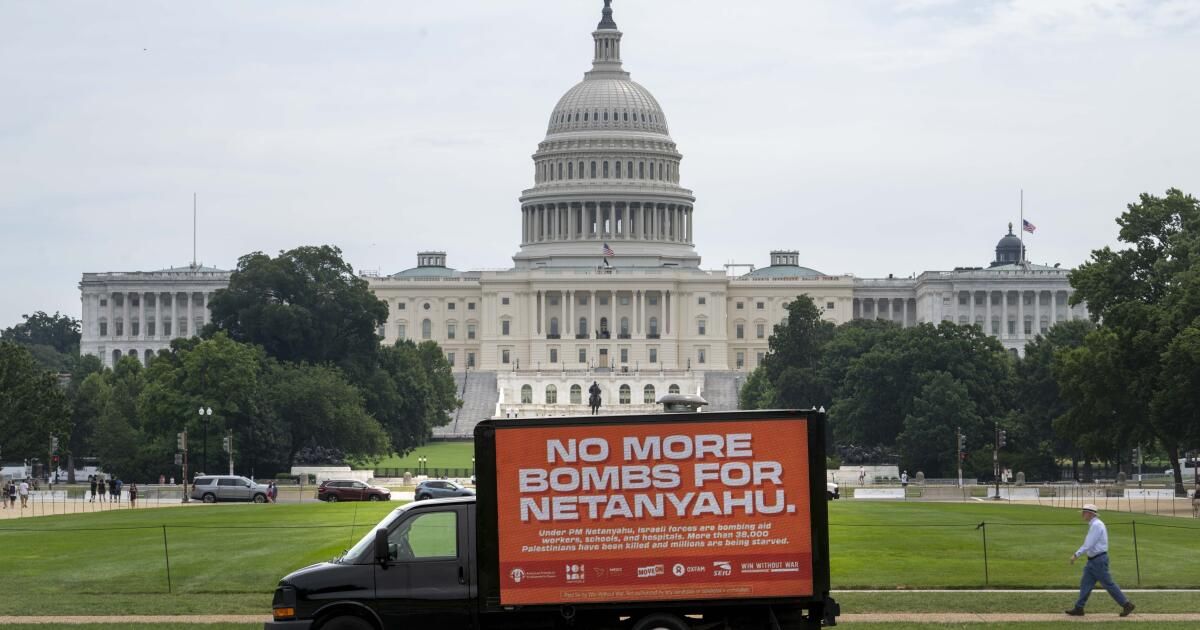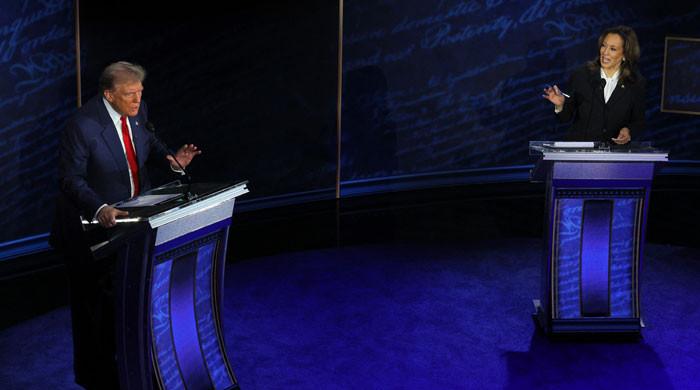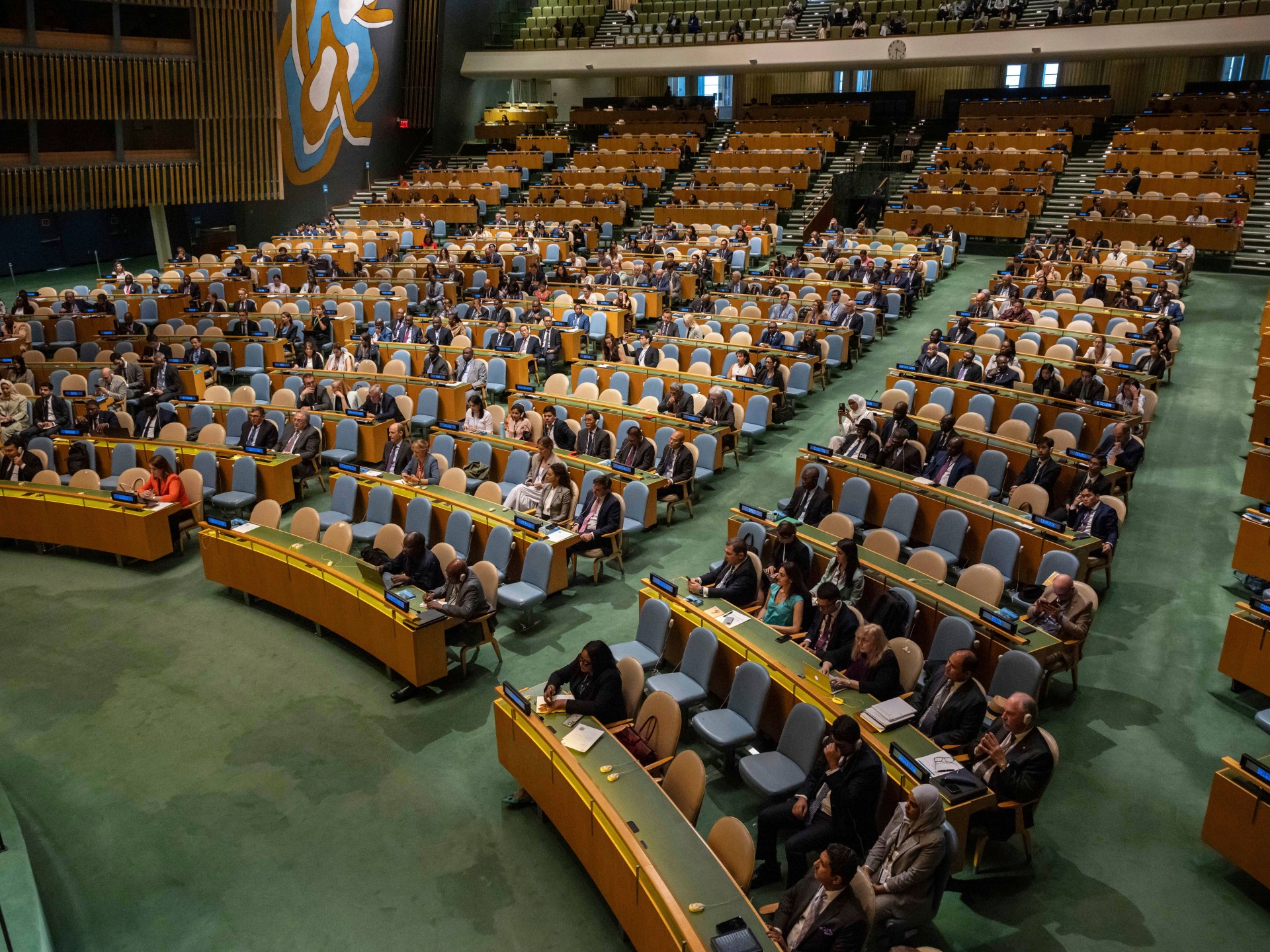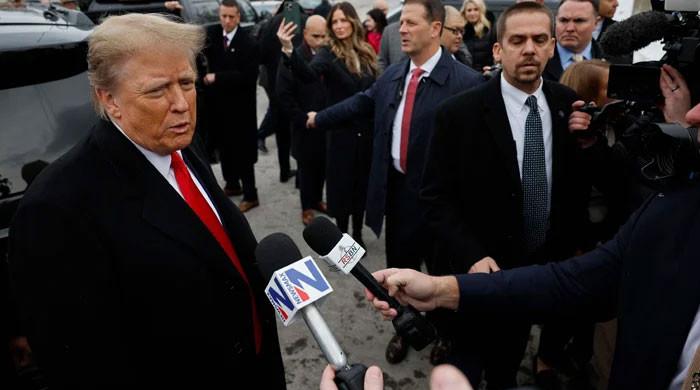Embattled Israeli Prime Minister Benjamin Netanyahu on Friday concluded a weeklong trip to the United States with a pilgrimage to Mar-a-Lago, where he greeted Republican presidential candidate Donald Trump, after stops at the two citadels of American power: the White House and Capitol Hill.
Netanyahu intended his visit to the United States to be a victory lap that would show the people of his country, especially his political base, that he still enjoyed the unconditional support of the United States.
What he received instead was more complicated, reflecting the divisions and political uncertainty here, and growing opposition, even among some American officials, to the way Netanyahu is conducting the Gaza war, which is about to enter its 10th month.
In separate private meetings with President Biden and Vice President Kamala Harris on Thursday, Netanyahu heard some of the toughest language yet on the urgent need to agree to a ceasefire in Israel’s war in Gaza, according to U.S. officials.
On Capitol Hill on Wednesday, he became the first foreign leader to be granted the honor of delivering a fourth address to a joint session of Congress, where he demanded help to continue fighting the war. But the reception was noticeably cooler than previous visits. Standing ovations were only partial. More than 50 Democratic lawmakers boycotted or were absent. And Palestinian U.S. Rep. Rashida Tlaib (D-Mich.) held up a sign that read “war criminal” on one side and “guilty of genocide” on the other.
Israeli Prime Minister Benjamin Netanyahu waves as he arrives to speak at a joint meeting of Congress to seek support for Israel's fight against Hamas and other adversaries, on Capitol Hill in Washington on Wednesday.
(J. Scott Applewhite/Associated Press)
At Trump’s Florida resort, Netanyahu was more interested in repairing the damage in his once mutually favored relationship with the man he hopes will once again be president. As president, Trump had given Netanyahu everything he asked for. But Trump turned on Netanyahu when the Israeli leader acknowledged Biden’s 2020 election victory over Trump.
A key goal for Netanyahu was to court the Republican Party, with which he hopes to have more influence. While most previous Israeli leaders have strenuously avoided taking sides in partisan fights in the United States, Netanyahu has long allied himself more closely with the GOP.
Just a few weeks ago, Trump and the Republican Party seemed to be on the rise, but this week's shock that vaulted Harris to the top of the Democratic presidential ticket upended those calculations.

Protesters demonstrate against Israeli Prime Minister Benjamin Netanyahu's visit to Mar-a-Lago to meet with former President Trump on Friday in Palm Beach, Florida.
(Jim Rassol/Associated Press)
In his address to Congress, he praised Biden, who announced earlier this week that he would not run again. Netanyahu praised Trump in even more glowing terms, and did not mention Harris by name.
On Oct. 7, Gaza-based Palestinian Hamas militants attacked southern Israel, killing nearly 1,200 Israelis and taking several hundred hostages. The massacre triggered a violent retaliatory war by Israel, which has shelled the narrow coastal enclave and killed more than 39,000 Palestinians, according to a Palestinian official. Israel has blocked most food and medical aid, leading to a humanitarian crisis.
In Washington, Netanyahu could not escape the mass demonstrations that have followed him in Tel Aviv and Jerusalem. Thousands of protesters lined up daily alongside his motorcade and held rallies in front of the Capitol and on the National Mall, which is dotted with monuments.
In his address to Congress — a largely dark speech in which he promised outright victory in Gaza — Netanyahu dismissed American protesters as “useful idiots” acting on behalf of Israel’s enemies.
Despite tensions in the relationship with a pro-Israeli Biden, the president gave a warm welcome to the prime minister at their meeting at the White House.
Harris declared herself a long-standing friend of Israel, but was more direct in criticizing the “devastating” toll of death and destruction among Palestinian civilians in Gaza.
“I will not remain silent,” she said after her meeting with Netanyahu. “The images of dead children and desperate, hungry people fleeing in search of safety, sometimes displaced for the second, third or fourth time… We cannot look away in the face of these tragedies. We cannot allow ourselves to become insensitive to the suffering.”
It remains to be seen how Harris will reorient US Middle East policy in contrast to Biden. The Israeli-Palestinian issue is a tightrope for Harris: she wants to reaffirm her sympathy for Israel while distancing herself from Biden's unconditional support for a country that is under strong reproach from many Americans.
Administration officials working with Biden and Harris insist there is “no difference” between the two leaders’ Israeli-Palestinian policies, but that there is a perception of a difference, perhaps because Harris was more outspoken from the start about Palestinian casualties.
Both Biden and Harris, in their meetings with Netanyahu, pressed him on a cease-fire proposal now on the table, which Netanyahu made no mention of in his speech. The deal would also free most of the hostages and increase aid to starving Palestinians in Gaza. It has been negotiated for months between Washington, Qatar and Egypt. U.S. officials say both Hamas and Israel have at one point or another held up a final agreement.
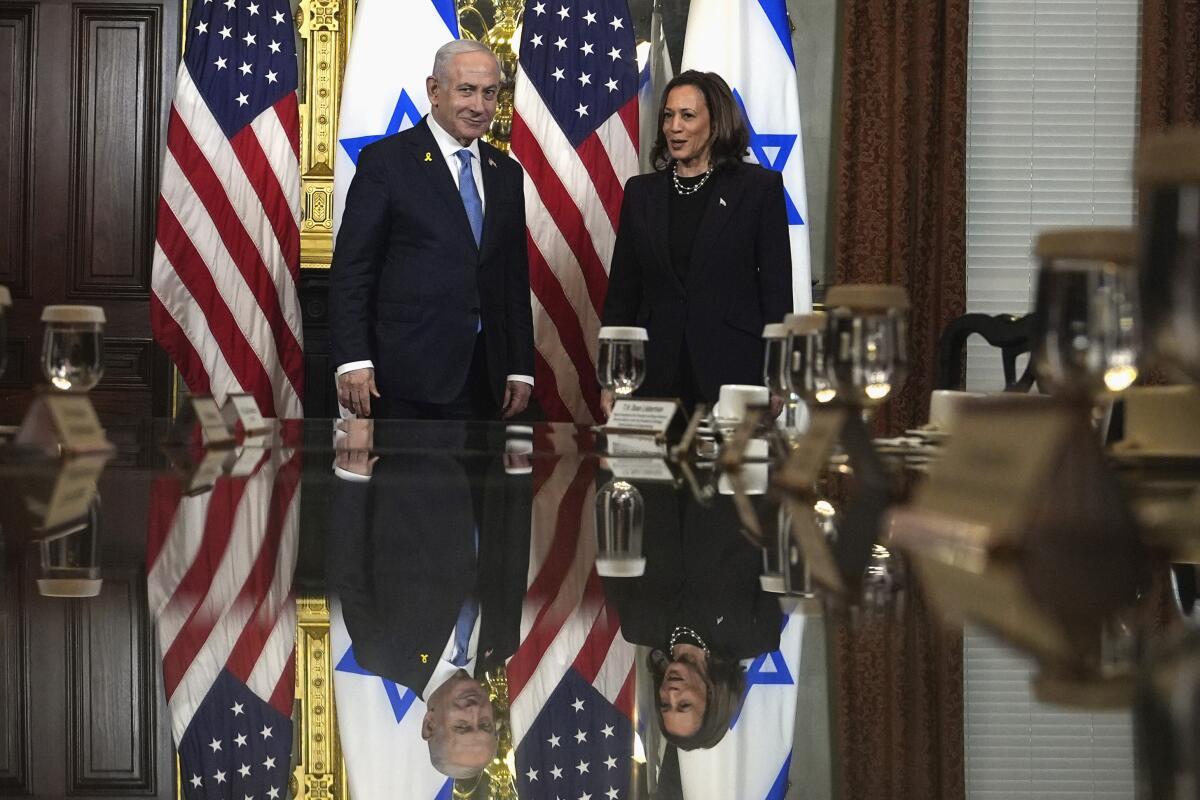
Vice President Kamala Harris, right, and Israeli Prime Minister Benjamin Netanyahu appear before a meeting in the Eisenhower Executive Office Building on the White House complex in Washington on Thursday.
(Julia Nikhinson/Associated Press)
Biden and Harris urged Netanyahu to move forward to close the “final gaps,” including a timetable for negotiating a permanent ceasefire and the withdrawal of Israeli troops from Gaza.
Netanyahu, in his public statements during his trip, has also made no mention of the creation of an independent Palestinian state, which the United States, regional power Saudi Arabia and many others see as critical to a lasting end to the Gaza war and broader Middle East peace. Instead, last week he led a first-ever vote in the Israeli Knesset to formalize official opposition to the creation of a Palestinian state.
Many critics, including many inside Israel, said Netanyahu, by taking such positions, is delaying any ceasefire agreement, even if it means sacrificing the hostages, as a way to protect his own political interests. The most radical members of his far-right government have threatened to bring down Netanyahu’s government if he makes any concessions before the complete annihilation of Hamas — a nearly impossible feat.
“Despite his unwavering defense of Israel, he is seen as a failure by many,” wrote Michael Koplow, policy director of the Israel Policy Forum, a U.S.-based think tank, in a weekly column appearing Friday, “both because of problems created by Netanyahu himself and because of his pervasive choice to put his own political security ahead of Israel’s fundamental security.”
Koplow added: “Netanyahu wins, Israel loses.”
Israelis who traveled to Washington to protest against Netanyahu, including relatives of Israelis and Americans still held hostage by Hamas, said many members of Congress and others in the United States do not understand how unpopular the prime minister is at home.
Long before October 7, opponents were organizing regular mass demonstrations in Tel Aviv, Jerusalem and elsewhere in Israel to denounce Netanyahu's efforts to reform and weaken Israel's judicial system and other measures they say would undermine Israeli democracy.
“Before Oct. 7, the question was, ‘Should Netanyahu resign or not? ’ Now the question is not if, but when,” said Nadav Weiman, a former Israel Defense Forces sergeant and sniper who now heads Breaking the Silence, a group of Israeli military officers opposed to Israel’s occupation of the West Bank. Weiman was in Washington to protest the prime minister and speak to the American public.
“Netanyahu came here to receive a standing ovation, because he would not receive one from anyone in Israel.”
Netanyahu, Israel's longest-serving prime minister, maintains that he alone is a strong enough leader to help Israel overcome the Gaza war and the numerous other threats he says the country faces.

